Your phone’s spying capabilities are more concerning than you might realize. Factors like unusual data spikes, unfamiliar apps, and phone overheating can indicate spyware presence. Spyware operates silently, collecting personal data through app permissions and often misusing them. Weak security measures, like outdated software or simple passwords, can make your device an easy target. Stay informed about your device’s vulnerabilities to better protect your privacy. Explore further to uncover crucial steps to safeguard your personal information.
Key Takeaways
- Spyware can silently monitor your activities and collect personal information without your consent, increasing privacy risks.
- Unusual phone behavior, like unexpected reboots or spikes in data usage, may indicate spyware presence on your device.
- Always review app permissions; over 70% of users accept them without scrutiny, leading to potential privacy breaches.
- Regularly update your operating system and apps to protect against vulnerabilities that could be exploited by spyware.
- Utilize antivirus software and enable two-factor authentication to enhance your device’s security against spying threats.
Signs Your Phone Might Be Spying on You
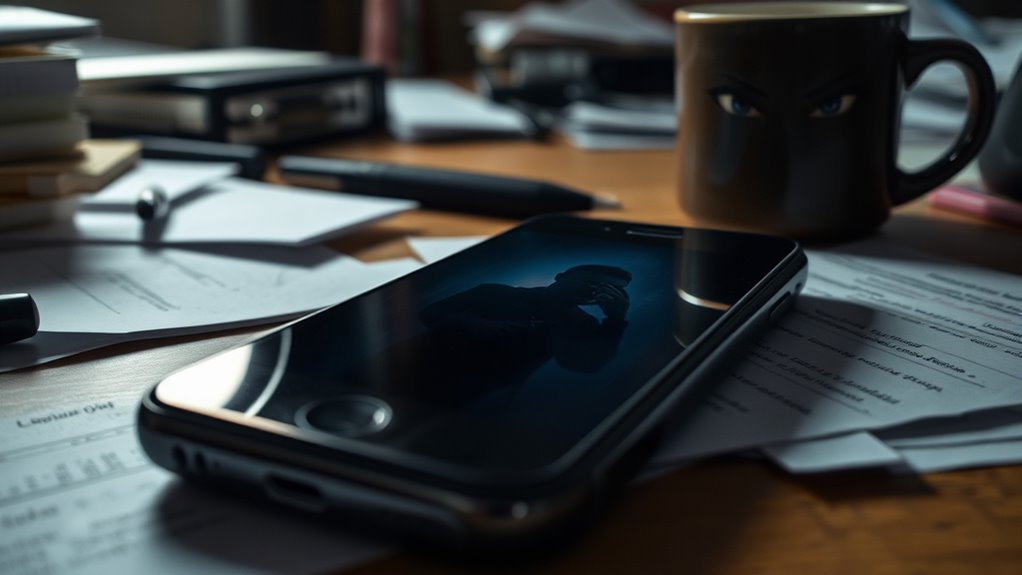
Have you ever noticed your phone acting strangely? Unusual spikes in monthly mobile data usage may indicate spyware apps are lurking, using your cellular or Wi-Fi network to siphon off data without your knowledge.
Frequent unexpected reboots or prolonged shutdowns can also signal potential hacking, as spyware interferes with normal operations. If you spot unfamiliar apps on your device, it’s a warning sign that spyware could be installed, so regular checks of your applications are essential.
Frequent unexpected reboots or unfamiliar apps can indicate spyware; stay vigilant about your device’s security.
Additionally, if your phone overheats while idle, it might be due to these apps consuming processing power.
Finally, strange noises during calls might suggest interception, prompting you to investigate your device’s security to protect your sensitive information.
Understanding Spyware Apps and Their Functionality
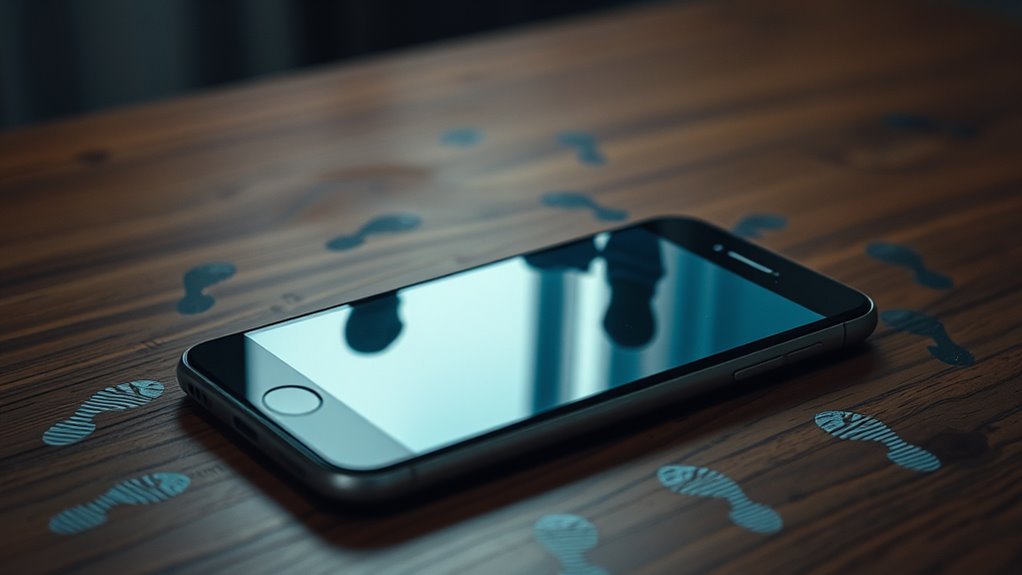
If you’ve noticed signs that your phone might be compromised, understanding how spyware apps work can help you take action. These apps silently monitor your activities, collecting personal information like texts, calls, and location data. Often marketed for parental control or employee monitoring, spyware usually requires physical access to your device for installation.
| Impact of Spyware | Emotional Consequence |
|---|---|
| Compromised personal privacy | Fear of being constantly watched |
| Unauthorized data breaches | Anxiety over identity theft |
| Eroded trust in relationships | Distrust in technology |
| Loss of sensitive information | Stress from potential exposure |
| Feeling violated | Sense of helplessness |
Spyware apps can operate invisibly, making detection challenging, and they transmit data through unencrypted channels, heightening security risks.
How Your Personal Data Is Collected
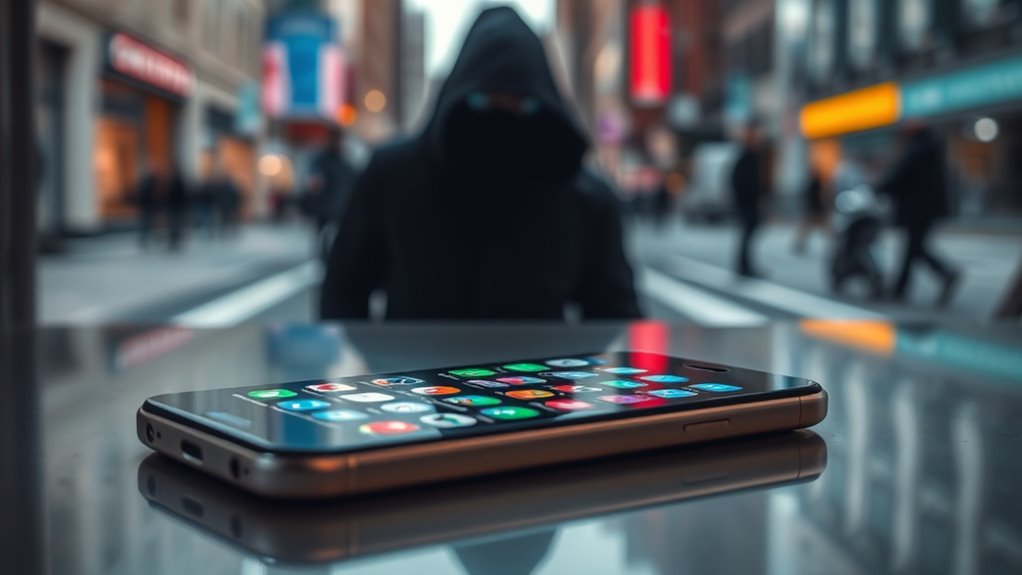
Your smartphone collects personal data in ways you mightn’t even realize.
Apps often ask for permissions that grant access to your location, contacts, and even your microphone, raising significant privacy concerns.
As you browse the web and engage on social media, marketing firms track your behavior to tailor ads just for you, further expanding your digital footprint.
Data Collection Methods
While many users may not realize it, smartphones are constantly collecting personal information through various methods. Mobile apps often require permissions to access sensitive data like your location and contacts.
This data collection method allows companies to gather GPS tracking information, which can be sold to third parties for targeted advertising. Additionally, your search history, app usage, and social media activity contribute to a thorough user profile, enabling advertisers to predict your interests and deliver personalized ads.
Behavioral data from your online activities further enhances this profiling. As these methods accumulate significant amounts of personal information, it’s essential to be cautious about the permissions you grant to apps and services, protecting your privacy in the process.
Privacy Concerns
Many users underestimate the extent to which their smartphones track and collect personal data. Your device constantly gathers information through mobile apps, GPS tracking, and sensors, often needing your permission for access.
Location data is particularly valuable, frequently sold to third-party companies for targeted advertising, which raises significant privacy concerns. You might feel anxious about how your personal data is used, leading to a growing awareness of data privacy rights.
Marketing firms analyze your web surfing and social media activity to predict your interests without eavesdropping on conversations. To protect your privacy, regularly check your device’s settings and limit data sharing with advertisers.
Additionally, understanding the importance of cybersecurity measures can significantly enhance your ability to safeguard your information in an increasingly data-driven world. Taking these steps can help safeguard your information in an increasingly data-driven world.
Common Vulnerabilities in Smartphone Security
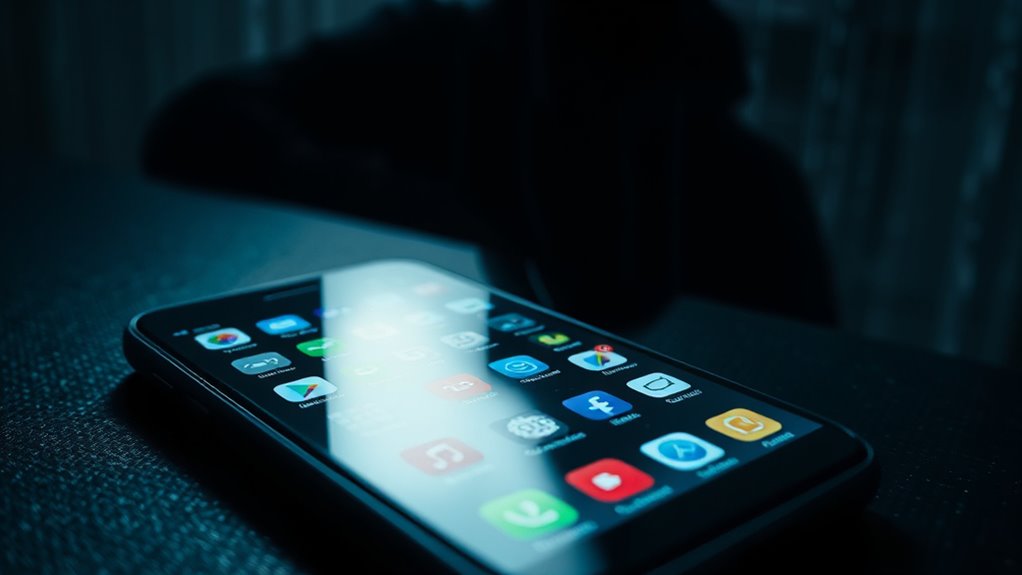
Your smartphone’s security can be compromised in several ways, and it’s essential to be aware of them.
Mismanaging app permissions, neglecting software updates, and using weak passwords can leave you vulnerable to attacks.
App Permission Mismanagement
When apps request permissions that exceed their core functions, they can create considerable privacy risks.
Many users overlook app permission mismanagement, with about 70% accepting permissions without a second thought. This can lead to unauthorized access to sensitive data, leaving your personal data vulnerable to misuse.
Some spyware apps disguise themselves as legitimate applications, exploiting this oversight to collect information without consent. The lack of clear privacy policies often leaves you unaware of how your data is used. Additionally, cybersecurity vulnerabilities can be exacerbated by such mismanagement, allowing malicious actors to exploit your device.
To protect yourself, regularly review and manage app permissions. By limiting access to only what’s essential, you can considerably reduce the risk of unauthorized access to your personal data and safeguard your privacy in an increasingly connected world.
Outdated Software Risks
As smartphones evolve, neglecting software updates can greatly increase your risk of cyber threats. Outdated software leaves your device vulnerable to exploitation by hackers, who often target known vulnerabilities in older systems. Regular updates are essential for receiving security patches that protect against malicious software and data breaches. Additionally, just like a Gold IRA, regular maintenance of your device is crucial to safeguard your investments from unforeseen risks. Predictive analytics can also play a role in anticipating potential cyber attacks and securing your device. The incorporation of QA early in the development lifecycle helps to ensure that software vulnerabilities are addressed promptly. Moreover, utilizing AI-driven tools can enhance your overall cybersecurity by providing real-time threat detection. The use of HEPA filters in air purifiers can significantly enhance the quality of indoor environments, similar to how regular updates improve device security.
| Risk Factor | Impact on Device | Recommended Action |
|---|---|---|
| Outdated Software | Increased vulnerability | Enable automatic updates |
| Malicious Software | Potential data breach | Install security patches |
| Lack of Updates | Susceptibility to threats | Regularly check for updates |
With over 40% of smartphones running outdated software, it’s vital to stay vigilant. Don’t let your device become an easy target for cyber-attacks!
Weak Password Practices
Neglecting strong password practices can leave your smartphone just as vulnerable as outdated software. Using easily guessable information like birthdays or common words makes it easy for hackers to steal personal data. Studies reveal that over 80% of data breaches stem from weak, reused, or stolen passwords. To enhance your security, implementing two-factor authentication (2FA) adds an extra layer of verification that passwords alone can’t provide. Additionally, necessary cookies can help improve your overall browsing experience by ensuring that your login information is securely stored and used effectively. Regularly updating your passwords and avoiding the same password across multiple accounts can considerably reduce risks. Consider using a password manager to generate and store complex passwords, ensuring you don’t fall victim to weak password practices. Furthermore, AI tools for real-time performance tracking can help monitor your accounts for any suspicious activity, further enhancing your security. Protecting your smartphone starts with adopting these essential habits. In addition, practicing risk management strategies can help safeguard your data from potential breaches.
Steps to Protect Your Phone From Spyware
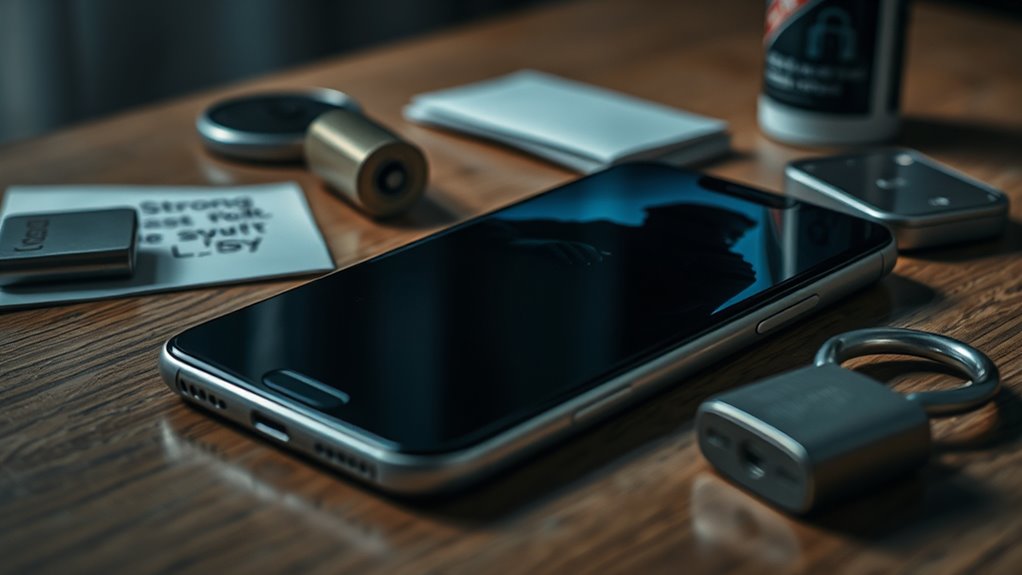
To safeguard your phone from spyware, it’s essential to take proactive measures that enhance your device’s security.
Start by installing reliable antivirus software to detect and prevent spyware, offering real-time protection and regular scans.
Always keep your phone’s operating system and applications updated; outdated software is more vulnerable to spyware exploits.
Avoid downloading apps from unknown sources or third-party platforms, as they can harbor spyware that compromises your information.
Enable two-factor authentication (2FA) on your accounts to add an extra layer of protection.
Finally, regularly review app permissions and restrict access to sensitive information, ensuring apps only have the permissions necessary for their functionality. Moreover, consider the impact of AI-driven diagnostics as they can assist in identifying potential security threats on your device.
What to Do If You Suspect Your Phone Is Compromised

How can you tell if your phone has been compromised? If you suspect your phone is compromised, start by monitoring your phone’s performance for unusual battery drain, slow speeds, or unexpected reboots.
These signs might indicate spyware activity. Next, run antivirus software to detect and isolate any potential threats.
It’s also wise to enable two-factor authentication (2FA) on your accounts for added security. Change your passwords using a different device to prevent interception by any malicious software.
Finally, manually review your apps and remove any suspicious or unfamiliar ones, as they could be indicators of spyware.
Taking these steps can help secure your device and protect your personal information from unwanted access.
How to Perform a Factory Reset on Your Device
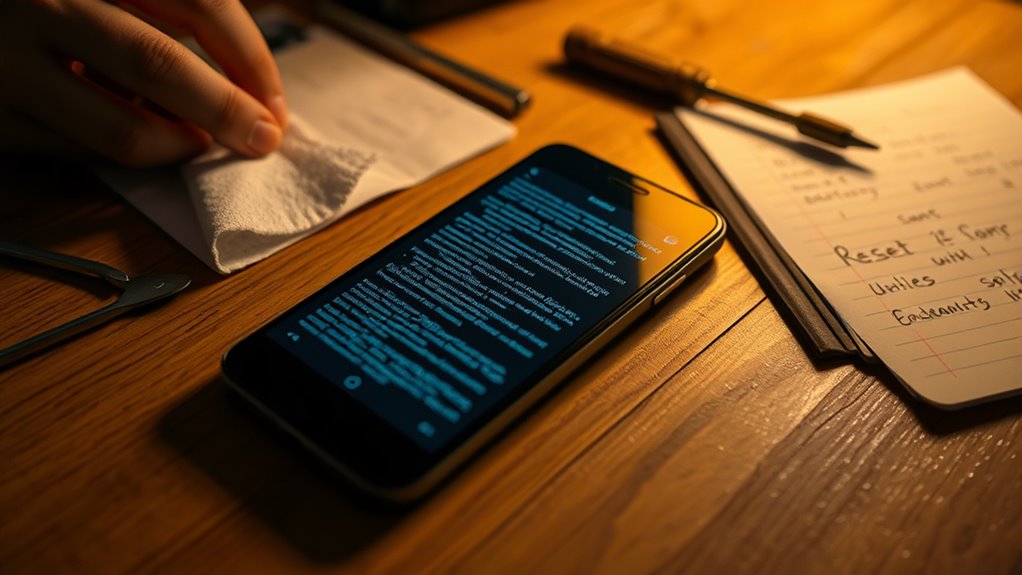
If you suspect your phone’s been compromised, performing a factory reset can be an effective solution to remove any spyware or malicious apps.
For Android devices, go to Settings > System > Reset options > Erase all data (factory reset). Be certain to back up your important data first, as this process will erase all personal information and apps.
For iPhones, navigate to Settings > General > Transfer or Reset iPhone > Erase All Content and Settings. Confirm your device is charged or plugged in during the reset to avoid interruptions.
After the factory reset, you’ll need to reconfigure your settings, reinstall necessary apps, and restore your data from backups to maintain peak performance and security.
The Reality of Remote Access to Your Phone
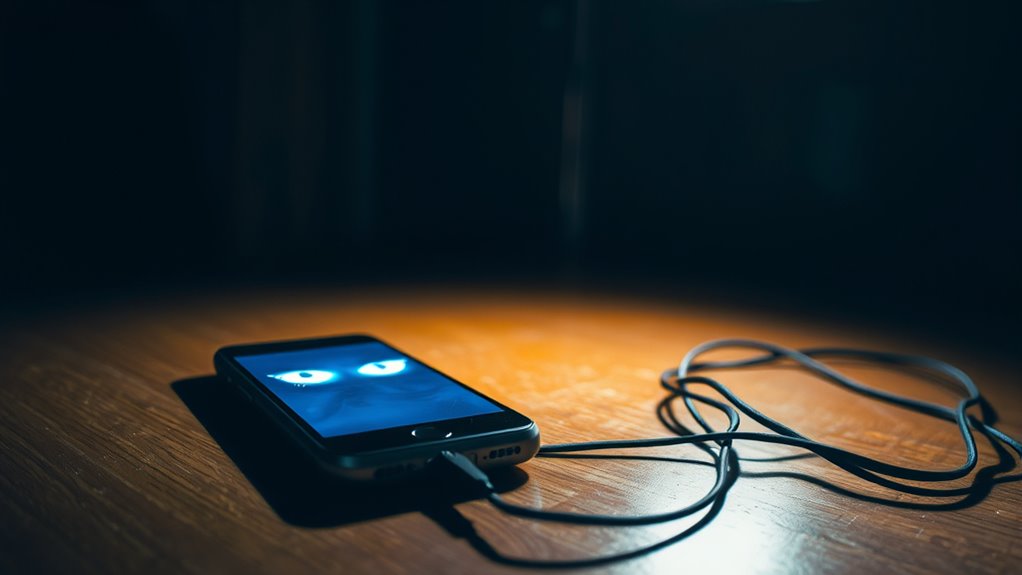
Even after performing a factory reset, the threat of remote access to your phone remains a pressing concern. Spyware apps can easily be installed with brief physical access, allowing unauthorized individuals to monitor your texts, calls, and location.
Even after a factory reset, your phone may still be vulnerable to spyware, enabling unauthorized access to your private communications.
This rising trend is alarming, especially with a reported 63% increase in spyware devices in the U.S. recently.
Consider the following risks:
- Unauthorized monitoring of your conversations
- Access to sensitive information without your knowledge
- Data transmission via unencrypted channels
- Exploitation of device accessibility features
- Publicly accessible storage of sensitive data
Being aware of these issues is essential to protect yourself from potential threats. Stay vigilant and safeguard your personal information.
Techniques to Detect if Your Phone Is Tapped
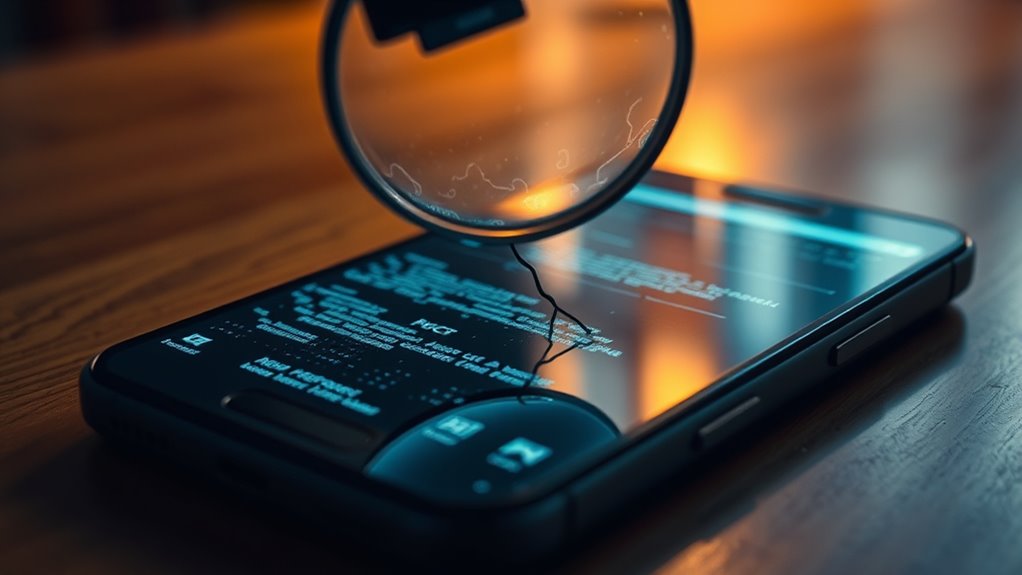
To protect yourself from potential spying, you need to monitor your data usage closely.
If you notice unusual spikes, it could mean spy apps are transmitting your information.
Additionally, regularly check the installed apps on your phone for anything unfamiliar or suspicious.
Monitor Data Usage
Monitoring your phone’s data usage is an essential step in detecting any potential spying.
Regularly check for unusual spikes in your monthly data, as spyware can secretly use your cellular or Wi-Fi connection. Here are some tips to help you:
- Check data usage in Settings:
- iPhone: Settings > Cellular
- Android: Settings > Network and internet > App data usage
Look for consistent high data usage, which may signal spy apps.
Identify apps consuming the most data; unfamiliar ones could indicate spyware.
Use data monitoring tools to track trends over time.
Report any anomalies to your service provider for further investigation.
Staying vigilant about your data usage can help protect your privacy from unwanted surveillance.
Check Installed Apps
Checking the list of installed apps on your smartphone is an essential step in safeguarding your privacy. Regularly review this list for unfamiliar or suspicious applications that may indicate spyware. Android devices often allow installations from outside the Google Play Store, so unauthorized installations can happen unnoticed. Additionally, ensuring you have efficient general ledger coding in place can help maintain oversight on app-related expenses and enhance your overall financial monitoring. Maintaining high-quality content on your devices can also contribute to better security practices. For instance, a popular viral ad campaign starring actress Laurel Coppock highlights the importance of being aware of what content you engage with on your device.
Here’s a quick guide to help:
| Action | What to Look For | Tools |
|---|---|---|
| Review Installed Apps | Unfamiliar or suspicious applications | Antivirus Software |
| Check App Permissions | Excessive permissions granted | Phone Settings |
| Monitor App Behavior | Unusual battery drain or data usage | Usage Monitoring Tools |
Additionally, understanding the sources of pollutants in your home can help you make informed decisions about your app usage and privacy settings.
Best Practices for Securing Your Online Presence
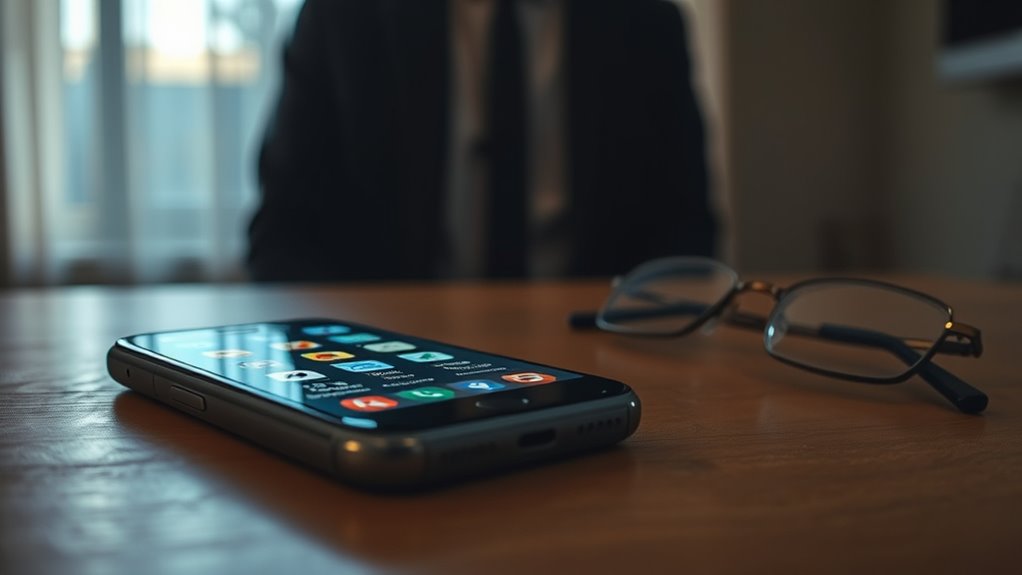
While it might seem convenient to grant apps access to all your information, doing so can considerably compromise your online security.
To safeguard your online presence, follow these best practices:
To maintain a secure online presence, adhere to essential best practices for your digital safety.
- Regularly review app permissions and limit access to sensitive data.
- Use strong passwords and enable two-factor authentication (2FA) on all accounts.
- Employ a Virtual Private Network (VPN) to encrypt your internet traffic.
- Keep your smartphone’s operating system and apps updated.
- Be cautious with online quizzes and unfamiliar emails to avoid spyware.
- Implementing AI security solutions can significantly enhance your protection against potential cyber threats.
Frequently Asked Questions
Are Phones Listening to Your Conversations?
Are phones listening to your conversations? While it might feel that way when targeted ads pop up after a chat, your phone isn’t actually eavesdropping.
Instead, advertisers gather data from your online behavior and app usage to serve relevant ads.
You can take control by reviewing app permissions and disabling microphone access for apps that don’t need it.
This way, you can minimize privacy concerns while still enjoying your device’s features.
How Can You Tell if Your Phone Is Spying on You?
To tell if your phone’s spying on you, watch for unusual spikes in data usage or unexpected reboots.
Check for unfamiliar apps that you didn’t install, and listen for strange noises during calls, which can indicate interception.
If your battery drains rapidly or your phone overheats while idle, that’s another red flag.
Regularly monitoring your device can help you identify potential spyware and maintain your privacy effectively.
Does Calling *#21 Tell if Your Phone Is Tapped?
Calling *#21# checks if your calls are being forwarded, which can hint at possible call interception.
If you see a message indicating call forwarding is active when you didn’t set it up, it might suggest someone’s tampering with your calls.
However, keep in mind that this code doesn’t detect spyware or other monitoring software, so it’s important to regularly review your phone’s settings and network activity for any unusual behavior.
Can Someone Watch You Through Your Cell Phone?
Imagine your phone as a window, one that could let someone peek inside your life.
Yes, someone can indeed watch you through your cell phone if malicious software, like spyware, is installed.
These apps can access your camera, microphone, and even your messages without you knowing.
Conclusion
In a world where your phone could be a secret agent, lurking in your pocket, it’s essential to stay vigilant! Imagine your device eavesdropping on your every whisper, turning your most private moments into a treasure trove for hackers. But don’t panic! By taking proactive steps to protect your phone and secure your data, you can keep those digital spies at bay. Remember, knowledge is your shield—wield it like a sword against the invasion of your privacy!









